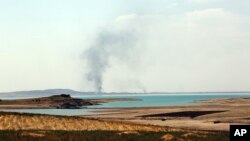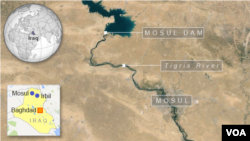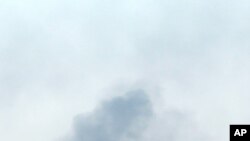Iraqi and Kurdish forces say they have retaken control of the key Mosul dam from Islamic State fighters, but the militants are disputing the claim.
An Iraqi army spokesman said the Iraqi flag has been hoisted at the dam, but acknowledged that the facility is not fully secure yet. Lieutenant General Qassim al-Moussawi says troops are looking for explosives left behind by the militant group.
''Some of the dam facilities have not been cleared yet. But what is important is that the security forces have arrived at the dam and they were able to capture the dam and conduct a full check around it to make sure that it's empty of bombs and explosive charges," he said. "The Iraqi flag has been raised on the dam this morning at 1100 [0800 GMT].''
The Islamic State called the Iraqi claim of control over the dam a "mere propaganda war," and the U.S. said fighting in the region is continuing. The dam is crucial to northern Iraq, providing electricity and irrigation for much of the region.
The U.S. military said it carried out 15 more airstrikes Monday against Islamic State militants near the dam, destroying more of their fighting positions and weaponry.
The United States first launched airstrikes earlier this month against the insurgents, in part to prevent the killing of thousands of minority Yazidis stranded on Mount Sinjar in northern Iraq.
US involvement
The chairman of the U.S. House Intelligence Committee said the air strikes, in addition to equipment provided to Kurdish fighters, have helped slow the advance of Islamic State militants across Iraq.
President Barack Obama Sunday sent a letter to congressional leaders announcing his authorization of targeted air strikes to support Iraqi forces in their effort to recapture the Mosul Dam from Islamic State militants, referring to it as a “critical infrastructure site.”
Obama warned failure of the dam “could threaten the lives of large numbers of civilians, endanger U.S. personnel and facilities, including the U.S. Embassy in Baghdad, and prevent the Iraqi government from providing critical services to its people.”
National Security Council spokeswoman Caitlin Hayden said the operations are limited in nature, duration and scope. She said they are being undertaken in coordination with, and at the request of, the Iraqi government.
U.S. Central Command Sunday said the air strikes, the second in the area in as many days, were carried out using fighter and attack aircraft and destroyed three IS armed vehicles, an IS vehicle-mounted anti-aircraft artillery gun, an IS checkpoint and an improvised explosive device (IED) emplacement. All strike aircraft are said to have exited the strike area safely.
The United States first launched airstrikes earlier this month against the insurgents, in part to prevent the killing of thousands of Yazidis stranded on Mount Sinjar in northern Iraq.
RAND Corporation senior political scientist and former U.S. Army officer Rick Brennan said the latest air strikes are the beginnings of what he called a “more reasoned” involvement in Iraq.
"The earlier argument that the president was making about the humanitarian mission and the limited assistance that we’d be giving I think was unrealistic given the type of assistance that the Iraqis need," he said.
"And so," Brennan added, "at this point in time, what the Iraqis need is assistance in trying to help in doing the operational planning and the integration of air and ground capabilities to try to move back ISIL.We need a strategic approach as to how we’re going to engage, how our western allies will engage, as well as the nations in the region will engage to turn back ISIL."
Britain’s Defense Secretary Michael Fallon Sunday told British military personnel on Cyprus that Britain’s role in Iraq had expanded beyond the original humanitarian mission. He said the Royal Air Force has flown missions to gather intelligence about IS movements. He added that Britain’s engagement could last months.
Fallon’s statement came after Prime Minister David Cameron warned the Islamic State group could target the United Kingdom unless action was taken.
Appearing on U.S. television Sunday, the chairman of the House Intelligence committee, Congressman Mike Rogers, warned of the continued danger posed by the Sunni militant group.
"ISIL now is a terrorist organization with an army. That’s what makes them so dangerous: tanks, helicopters, heavy artillery, money. All of those equate to a pretty dangerous situation," said Rogers.
Rogers said, however, that Kurdish ground forces, now better armed, are regaining lost ground.
"So, the peshmerga had a strategic withdrawal are armed up a bit and now have some air support, both from the Iraqi Air Force and the U.S. Air Force and have made real progress around that dam. Fighting still continues as of this morning, but it looks like they’re starting to gain the upper hand and pushing those ISIL units, the terrorist organization units, back away from the dam. It is a strategic asset and something important to take before they move into Mosul," continued Rogers.
Brennan said U.S. forces on the ground are organized into planning cells in Erbil and Baghdad and are providing Iraqi security forces with critical intelligence. But those forces, he said, will eventually need advise-and-assist logistics support as they conduct offensive operations.
Brennan warned that IS militants will continue to pose a regional, and to an increasing extent international threat, unless they’re stopped now.
"There have been estimates as many as 1,000 people, who are affiliated with ISIL, have passports either to the United States, Canada, Australia or our Western allies in Europe," said Brennan.
He warned that allowing them to have safe harbor in Iraq and Syria will only invite the kind of attacks in the West carried out by al-Qaida a decade ago. Rogers said the world faces a greater terrorist threat now than before 9/11.
Pope Francis on the use of force
Also Monday, Pope Francis said it is legitimate for the international community to use force to stop Islamic militants in Iraq. But he said that it should not be up to a single country to decide how to intervene in the conflict.
Meanwhile, the U.S. State Department, acting under an edict targeting terrorists, imposed an asset freeze and travel ban on Abu Mohammed al-Adnani, the Islamic State spokesman.
Edward Yeranian contributed to this report from Cairo.






